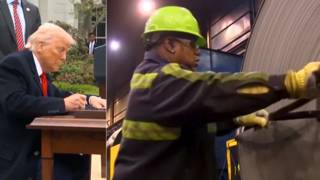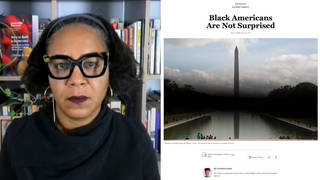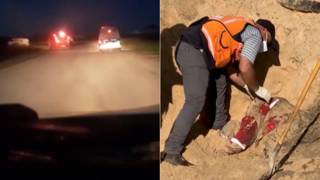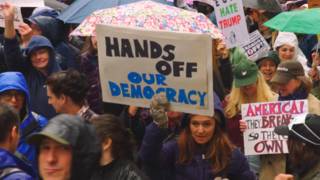
Guests
- Mohamed NasheedMaldives President
- Taukiei Kitaladelegate from Tuvalu
- Maylin Sese23-year-old from the Solomon Islands
“For us, this is more than just another meeting,” said President Nasheed. “This is a matter of life and death.” Eighty percent of the Maldives lies three feet or less above sea level. The predicted rise in sea level caused by global warming could wipe the country off the map. The islands of Tuvalu and the Solomon Islands face a similar crisis. [includes rush transcript]
Transcript
AMY GOODMAN: The President of the Maldives, Mohamed Nasheed, has been one of the most outspoken leaders to call attention to the dire consequences of climate change. Eighty percent of the Maldives lies three feet or less above sea level. The predicted rise in sea level caused by global warming could wipe the country off the map.
President Nasheed addressed the UN climate summit on Wednesday.
PRESIDENT MOHAMED NASHEED: Developed countries created the climate crisis. Developing countries must not turn into a calamity. Therefore, I invite the leaders of big developing countries to recognize their responsibilities. I urge them to come forward at Copenhagen with quantifiable and verifiable actions to reduce emissions 30 percent below business as usual by 2020.
Let me be plain. We urgently need to move forward. Giving us intensity targets that are close to business as usual is not acceptable at this stage.
Ladies and gentlemen, I believe that you should not ask others to do something you are not prepared to do yourself. The Maldives has pledged to become carbon neutral by 2020.
And I have been hugely encouraged by the steps already taken by least developed countries and small island states to begin getting their economies green. At the recent Climate Vulnerable Forum in Male, eleven states pledged to raise their ambitions in leading the world towards carbon neutrality. This is an enormous opportunity to reduce future emissions before fossil fuel infrastructure is built. But it cannot be done without the financial support from rich countries. I say to the industrialized world, you have the finances and much of the technology; please help us go green.
When we say this, please bear in mind that climate change negotiations have nothing, nothing at all, to do with money. Maldives is a very small state. We have never received aid from European Union countries. Whatever we have been able to do, we have been able to do with our friends and neighbors, and we have been able to fend for ourselves. Climate change negotiations have, for me and for our country, everything to do with our grandchildren. I have two daughters. I want to see grandchildren. If we continue business as usual, we will not be able to see our grandchildren. To assume that climate change has anything to do with money, in my mind, is the height of arrogance.
I am also encouraged by regional climate initiatives in places like California and Quebec, where true leadership is being shown. Outside the rim of the nation state, their standards, their ambitions are much, much higher than the center. Climate change, I do understand, is an issue that transcends nationality, that trandscends the nation state. And what we have on offer from the centers, from heads of states, falls far shorter than what we are seeing from sub-regions or from provinces and from states.
Ladies and gentlemen, Kyoto divided the world. It divided us between rich and poor, developed and developing, Annex I and Annex II. Our task now is to unite the world behind the shared vision of low carbon growth. The Maldives is trying to lead the way. I call upon every country in this room to join us, not just for the sake of the Maldives, but for the sake of the entire planet. If we are not able to seize this opportunity, and if we are not able to come to an understanding during the course of next forty-eight hours, I’m afraid we might very well be doomed. I hope that that is not what we are contemplating. Thank you very much.
AMY GOODMAN: The President of the Maldives, Mohamed Nasheed, speaking here in Copenhagen, addressing the UN climate summit on Wednesday. Yes, Mohamed Nasheed, the President, held an underwater news conference of his entire cabinet a few weeks ago. Everyone was there except for a few members who didn’t know how to scuba dive.
This is Democracy Now!, democracynow.org, The War and Peace Report. It’s Climate Countdown.
At a news conference earlier today, the Prime Minister of the island nation of Tuvalu issued an urgent call to ensure that global temperatures do not rise by 1.5 degrees Celsius. Prime Minister Ielemia also highlighted the immense pressure that small island states are coming under to accept a weak deal. He said, quote, “Under the last few days we have seen considerable pressure to accept a deal based around two degrees limit. We have not yielded to this pressure because our future is not negotiable.” He highlighted pressure from Australia, in particular.
For more, I’m joined now by the negotiator for Tuvalu, Taukiei Kitala.
We welcome you to Democracy Now! You’ve just come out of that news conference. Can you talk about, first, what does global warming mean for your country? And locate it for our listeners and viewers in the United States and around the world who may not have even heard of Tuvalu.
TAUKIEI KITALA: Global warming in Tuvalu, it’s really an issue. When we look at things that are happening right now in Tuvalu, in regards to sea level rise and also really high tides — we experience high tides during the months of February and March — we have been living with a lot of doubts, that the future looks really, really doubtful, the future of Tuvalu.
And the Prime Minister actually really stressed out that we are not here in Copenhagen to strike a deal that will jeopardize our survival. But it seems that whatever that has been happening around the corridors or behind the scenes has created a lot of unease, that now we question our survival.
Will Copenhagen come up with a real deal? Will Copenhagen provide assurance that Tuvalu will have a good future? We might be talking about looking — we might be looking at things at the moment, you know, that happening at the moment. The question, the big question, is always put forward by Tuvaluans, is what is going to happen in the future? We’re worried about our next generation or our future generations. The issue here is that — whether our kids will ever enjoy the beautiful sands and the millions of corals that we have.
AMY GOODMAN: How large is the population of Tuvalu?
TAUKIEI KITALA: Tuvalu, it’s just over 10,000 people in total. And our land is so narrow. It’s just land, strips of land, that goes — runs long as up to five to six kilometers long, and it gets to about a kilometer wide. That’s the widest point of the island. But it gets really narrow at some points that go up to only five meters. That’s how narrow Tuvalu looks like.
AMY GOODMAN: Secretary of State Hillary Clinton just arrived here and held a news conference, is saying that, though being somewhat vague about it, countries are getting, in the way of a deal, that the US is laying something on the table, $100 billion to begin in 2020 from the US and other countries — when asked by a Japanese journalist how much would the US commit, she wasn’t clear — but only if a deal is arrived at by tomorrow. Otherwise, it’s off the table. Finally, your message to the US government on what you want to see happen here?
TAUKIEI KITALA: Well, our message was clear, which was relayed by our prime minister: we want 1.5 degrees, not more than 1.5.
AMY GOODMAN: That’s 2.7 degrees Fahrenheit for people in the United States.
TAUKIEI KITALA: OK. Now, the deal that the US would like to see, I think what they really want to see, it’s like — they would like countries like Tuvalu, small island states and less developed countries, to strike a deal on a two degree, which we don’t want.
AMY GOODMAN: What would it mean?
TAUKIEI KITALA: It means — it means a lot to us in Tuvalu. Even at the 1.5, it is really critical for us. If we go beyond 1.5, we’re just — it’s just a matter of life and death for us. And putting money on the table will not solve anything, will not guarantee our survival. That’s not a question.
AMY GOODMAN: Taukiei Kitala, I want to thank you very much for being with us, a Tuvalu delegate, climate delegate, here in Copenhagen, as we end this segment with a young woman I met the other night. She was one of the youth delegates here. She was from another small island nation. She was from the Solomon Islands, had traveled for many, many hours to get to Copenhagen. And she, like many of the youth, were ultimately being kicked out of the Bella Center.
MAYLIN SESE:My name is Maylin Sese, and I am from Solomon Islands. I am twenty-three. And I am with Pacific Survival, Project Pacific Survival. It is a theme that we are here to raise our voices on survival, on Pacific survival.
And I’m here in COP15 because many people don’t believe about climate change, but I’m here, in person, to tell people, tell the world, the world leaders, that climate change is definitely, absolutely a real issue in my place. I have — climate change has been visible in my place. We have shorelines washed. We have our lands being affected by climate change. It affects the food crops by the heat of the sun and unpredictable weather. And we also have increasing sea level rise, that it causes losing of our island. And it is a big issue, when it comes to relocation, when it comes to economy, when it comes to adaptation to another place. It is a problem to us. So I am here. I am here to express and to show to the world how far I came is how deep my concern is about climate.
And my only hope is if the world leaders could show their kindness, their legitimate kindness, legitimate kindness, to youths, to show their concern to youths like me, to youths like me, and count my coming to this place, that far, and accept to sign this deal, make it, seal the deal, make it legally signed, so that it would be a hope. And to me, it would be a greatest souvenir I ever have in my life, because it’s my future, and it is a hope that I will take with me all my life. And it would be a hope for my children and my children’s children. With that, thank you very much.
AMY GOODMAN: This is Climate Countdown, Democracy Now!, democracynow.org, The War and Peace Report. We’ll be back in a minute.












Media Options